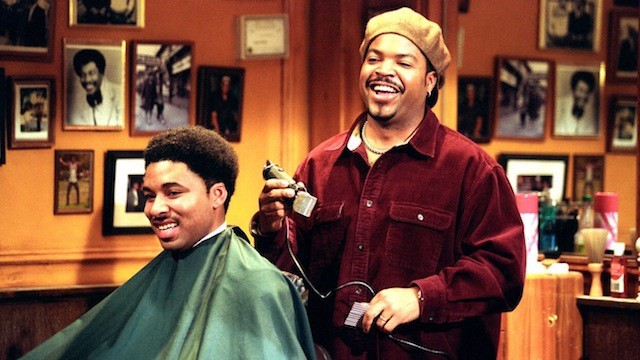Hundreds Of Cheap, 5-Star Barbers & Other Mysteries Of Yelp

To what degree can we rely on what we read on social media rating sites like Yelp?
For instance, say you’re trying to find a good haircut in New York City. Yelp is a reasonable place to start. I’ve found good haircuts that way — usually by also searching for keywords like “curly.” Apparently, though, a decent barber is harder to find.
My husband Ben recorded his frustration for me, after yet another foiled trip out:
If you search for “barber” in “new york” on Yelp, you will find about 40 barbers with dozens, sometimes hundreds, of reviews and a perfect 5-star rating. Not 4.5, perfect 5. If you filter by price, you’ll see that most of them are in the 1 to 2 dollar-sign range. I’ve been to these haircut places. They give you a haircut that is fine, but it will not in any way substitute for a really really good haircut.
The problem is that it seems like the people who review the better-quality haircut places are much more stingy with the 5-star reviews. So as a result, you have two different sets of rating standards being commingled when you search for “barber.”
This annoys me to no end because when I am looking for a better-than-average haircut that is also fairly affordable, it totally screws up my search process to have all of these perfect five-star reviews of places that people say gave them “the best haircut of their lives” but in fact give mediocre haircuts as compared to three-times-more-expensive places that only have, say, 4 stars. I keep thinking to myself, how could 400 people who rated this place perfect 5 stars be wrong? And yet they are . . . .
A slurry of five-stars ratings can indeed render a search meaningless. And a search engine, too. If Yelp keeps promising me affordable five-star haircuts from places that only produce mediocre results, I’ll lose all faith in the app and stop using it.
Still, I imagine grade inflation is a net positive for a particular business, at least at first. It can boast of its perfect score on its webpage and in the store itself. When a new barbershop opens in a city glutted with them, I can understand the kind of panic that might drive it to do whatever it can to pump its rating up. Even if, in the long run, it hurts them, because customers come in expecting greatness and leave feeling sour.
The five-star problem must also be frustrating for a business that’s actually putting in the effort to be great and trying to stand out from among its competitors online. It’s like Syndrome says in The Incredibles:

In most cases, though, it seems like small businesses tend to be plagued by the opposite problem: ratings that are artificially depressed, which can keep potential customers from trying those stores at all.
One medical student, who managed the social media for her family’s restaurant for the last few years that it was in business, told me bluntly that “anyone who owns a small business will come to abhor Yelp.” She lamented that “disgruntled former employees can write ‘reviews.’ Technically, Yelp’s terms of use prohibit this, but even if the ‘review’ explicitly states ‘I worked here …,’ and you report this misuse to Yelp, they don’t ever respond to complaints, let alone take any action.”
There should be, she said, some recourse for the businesses, especially in the case of libel.
Another peril are the Yelp users she called “sport reviewers.”
They’re the folks who, if you look at their profiles, you’ll see have written 27 one-star reviews, along with one five-star review for their girlfriend’s business. I myself had a friend who prided himself on being a ‘sport reviewer,’ and I must admit that his reviews were impressively well-composed, often humorous barbs. But I can’t help but be acutely aware that these folks have no real sense that they’re messing with someone’s business, with someone’s livelihood, for kicks.
How much can those individuals mess with someone’s livelihood? To find out, I spoke to Jonathan Rubinstein, founder of Joe, The Art of Coffee, a NYC-based chain. His opinion of Yelp is more mixed: he called it “a great tool” and, at the same time, “a necessary evil.” He added, “It can be very beneficial but also enraging.”
He shared one cautionary tale:
The morning we opened our 1st Philadelphia store, three 1-star reviews came in within 5 minutes of each other. Clearly they were connected to our competition and clearly they were sitting together and conspiring. (As a side note, that store has only gotten one other 1-star review in the 2 1/2 years since so the chances of three reviews in 5 minutes being random was none.)
Because we only had 10 reviews for the first month of business, our average for 21/2 starts, which definitely hurt us, and there was nothing we could do. Over time, these reviews have weighted differently and we now have a 4 star rating.
Still, he said, “All in all, I am certain it has helped drive sales and customers.” And, he added, the site allows him to engage with customers one-on-one.
I personally read every review of every store and respond to almost all of them, certainly to any negative ones. This is a great way to show you care and make situations right, and people are generally floored and appreciative that the owner takes the time to reach out personally.
I asked a Yelp spokesperson about what safeguards the app has in place to keep it reasonably fair and reliable. Here’s her reply, which I think is worth sharing in full:
Yelp has an automated recommendation software in place which is engineered to highlight the most useful and reliable content to consumers who visit the site. Our stance is quality over quantity and we err on the side of caution when it comes to protecting consumers and providing trustworthy and reliable content. That’s why we currently recommend about 75% of the reviews that are submitted to Yelp. This means about 25% of the reviews submitted to the site are not published on a business’ listing or recommended to consumers (nor do they impact their business rating). Our recommendation software looks at a number of data points to determine if a review is trustworthy. More often than not, the reviews we recommend come from the most active and engaged members of the Yelp community.
The recommendation software is engineered to weed out possible fakes (several reviews generated from the same IP address), biased reviews (written by a competitor, a disgruntled employee, or solicited by a business owner from friends, family members or favorite customers), and unhelpful rants or raves. While we don’t have specific details on the business in question, our usual process is to review any content that’s been flagged by a user or a business owner and to respond to those inquiries. Unfortunately, I can’t track that information or process in this instance.
If a business owner feels that a review on their business page violates Yelp’s Terms of Service, they can flag that post for review by our user operations team. However, Yelp does not take sides in factual disputes, so a business owner’s best bet is to use Yelp’s free tools to respond to the review, stating the facts and their company policy. Yelp instructs reviewers to provide truthful accounts of their experiences and to be prepared to stand by their reviews. Business owners have the same opportunity to respond publicly and provide their side.
It’s necessary to have our automated system and user support team in place because, without these systems, Yelp would be overrun with unreliable/unhelpful/fake content and consumers would not be able to trust Yelp to help them make spending decisions. It’s not a perfect system — after all, legitimate reviews sometimes look questionable, and questionable reviews sometimes look legitimate — but we think it does a pretty good job given the sheer volume of millions of reviews on Yelp.
She added that “we have a Business Owner blog with lots of resources/free tools for business owners who are looking to manage their reputation online with Yelp. This page gives a quick glance and includes a link to some of those resources.”
And you, dear reader? Has Yelp helped you more, or hurt you, and have you come up with novel ways to use it efficiently and well?
Support The Billfold
The Billfold continues to exist thanks to support from our readers. Help us continue to do our work by making a monthly pledge on Patreon or a one-time-only contribution through PayPal.
Comments